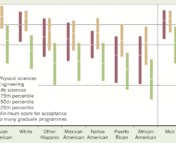Congratulations! After working so hard applying to graduate school, you’ve been accepted! You may have started getting emails from the department inviting you to visit their school. You’re excited to visit, but then you start wondering what questions you need to ask to make a fully informed decision. Here are some questions you can ask your advisor, your department, and yourself in order to make this big decision!
Questions for the Department
The best way to learn about a department is to talk to the graduate students! Make sure you talk to graduate students who are in their first few years and to those who are close to finishing to get a sense of how the department has changed over time. You can also ask similar questions to faculty and staff to get more insight on the department. Some questions to ask:
- Why did you choose this program at this institution? How do you feel about your decision so far? Is there anything that you wish you knew before that you know now?
- Do you feel supported in the department? By faculty, the institution, other graduate students? How easy was it to find and establish that support system?
- Do you feel supported by your advisor(s)? Do you feel like you have a good advisor-student relationship with them? Is there anything I should know about them?
- What does a typical work day look like for you? Do you work from home or do you have to go to campus often? Does your department support you in either choice to work from home or come in person?
- What is the cost of living here and is it reasonable on a graduate student stipend? Are there students with families and are they supported? Does the stipend increase each year?
- Are there health insurance benefits and are they covered by the department or do you need to pay for it? Does it include vision and dental? How do you feel about the coverage provided by the University plans? Is mental health covered by the insurance benefits?
- Are there additional fees that students need to pay for per semester or per year? Are those covered by the department?
- Are there funds provided to first year students for moving/travel expenses? How do I access these funds?
- Does the university have a union?
- How are traveling expenses handled? Do they have a way to pay for flights, lodging and per diem upfront? Or do you have to pay for it all yourself and get reimbursed later?
- Is housing provided? Are you required to live in specific housing or is there flexibility? Are there resources for on and/or off campus housing for graduate students?
- How walkable and/or easily accessible is the town/city and the university campus? Do you need to rely on public transportation and ride-sharing services, or do you need a car to get around?
- Do you know of any students that have left the program either by dropping out or mastering out? Why?
- Do you have time to do fun things outside of work? Are there places around to go and have fun?
- Does the department feel like a community and have you felt connected to other graduate students in your department? Do you feel isolated?
Questions for Potential Advisors
Choosing an advisor is one of the most important decisions you will have to make in graduate school. You will be working with them closely for the next ~5-7 years, so it’s best to know as much as you can about them coming into the program. Here are some questions to ask potential advisors to help you find your perfect match.
- What is your mentoring style? Are you more hands-on or hands-off when it comes to advising students?
- What does your start-to-finish timeline look like for individual projects? How long do projects take on average in your group? Is there a number of projects that you expect me to complete in order to get my PhD?
- How are your current students supported? Through teaching assistantships (TA), research assistantships (RA), fellowships or some other sort of funding? How would I be funded if I were to come here? How many years of funding do I have guaranteed and what type would it be (TA, RA, etc.)?
- Are there required classes in the PhD program that I need to complete?
- Are there qualifying exams and what exactly do they entail? Do I need to take them at a specific time in my PhD or is there flexibility?
- Would I have funding for travel to conferences, workshops, summer schools, etc.? Would I have funding for school supplies, laptop and other materials needed for me to be able to do my research?
- What are your expectations of me as a student working with you? Are there specific expectations when it comes to coming to campus/lab, responding to emails/messages, working or not working on the weekends and evenings?
- What is the average time it takes to get a PhD in your group and in the department?
- Where are your past students now? What careers have they pursued and how did you help support them in that decision?
- Does the department have an equity, diversity and inclusion committee (EDI)? How do they support students from underrepresented backgrounds?
Questions to Ask Yourself
Often, people tend to rely on the experiences and advice of other graduate students and potential advisor(s) when selecting a graduate school. However, ultimately you need to make a decision for yourself. As Dra. Nicole Cabrera Salazar writes in her Twitter thread about choosing a graduate school, “[…] you know yourself better than any of us looking out for you. [Y]ou have it [sic] everything you need in your spectacular hearts and minds to make the perfect decision for you.” After you have asked all of the questions you could think of to your potential department, you could ask yourself these questions:
- Can I see myself living in this town/city/state/country and do I see myself being happy here?
- What do I value in my life (family, hobbies, nature, etc.) and does this PhD program and location align with those values?
- Would I make enough money to sustain myself (and maybe my loved ones)?
- Do I feel covered and supported by the offered healthcare benefits?
- Does my potential advisor(s) have similar values and does their work-style allow me to pursue those things while doing my PhD here?
- Does my potential advisor(s) seem to have the experience or interest to mentor me in the case I decide to pursue a career outside of academia?
- Does the department seem to be a cohesive, supporting and encouraging community?
- Was there anything that made me feel uncomfortable when I interacted with my potential advisor(s), other graduate students or department? (Trust your instincts!)
- Were there other students, faculty or staff that shared my identity?
- Are there organizations, initiatives or resources available at or through the university if you ever need extra support (counseling center, disabilities office, etc.)?
After you’ve gathered all the information you need from your potential advisor and department, take some time to think about all of these different things. Only you know what you need from a program in order to succeed and pursue your desired career. In addition to thinking about these things, there are other things you can look out for while visiting that you may not explicitly ask about, but can tell you a lot about the environment in that department. Here are some examples:
- What does the graduate student population look like? Is there a diversity of backgrounds for students or does it seem to lack students from underrepresented backgrounds?
- Are there faculty that share your identity?
- What does the interaction between students and faculty look like?
Finally, I want to acknowledge how overwhelming all of this can be. Be graceful to yourself and remember you are not alone in this! Take it one step at a time, and you will be able to choose the best graduate school for you.
Astrobite edited by Sonja Panjkov
Featured image credit: Arafat Uddin (Wikimedia Commons)
If you would like to have infographics about these questions, here are some made by PhD Candidate, Paola Figueroa-Delgado. It includes most of the questions mentioned in this article!




